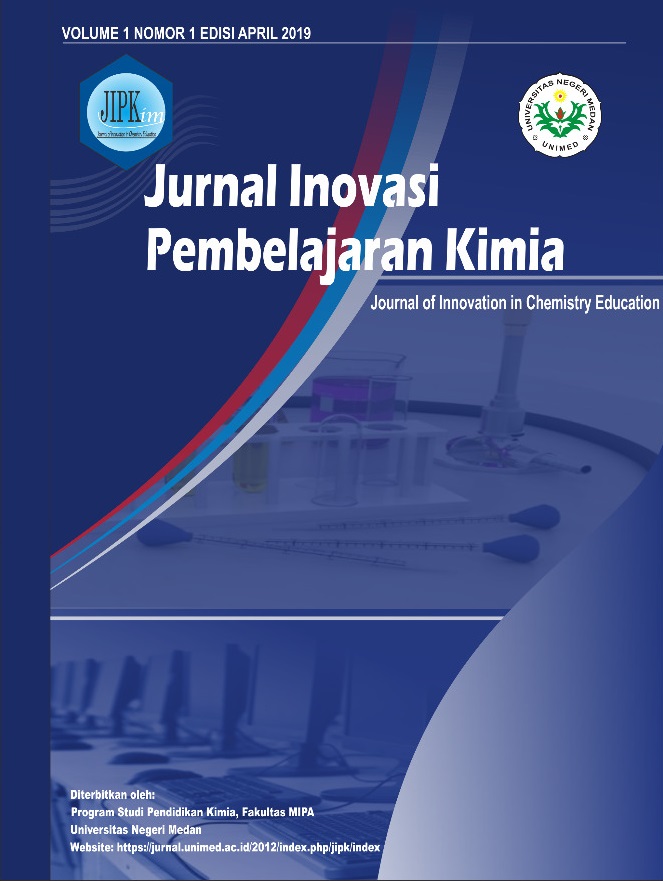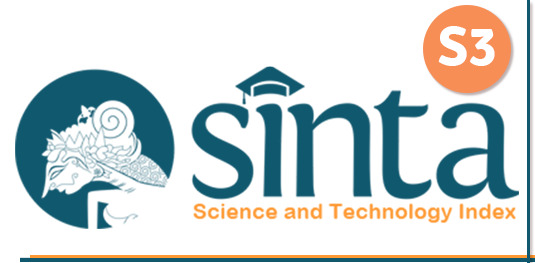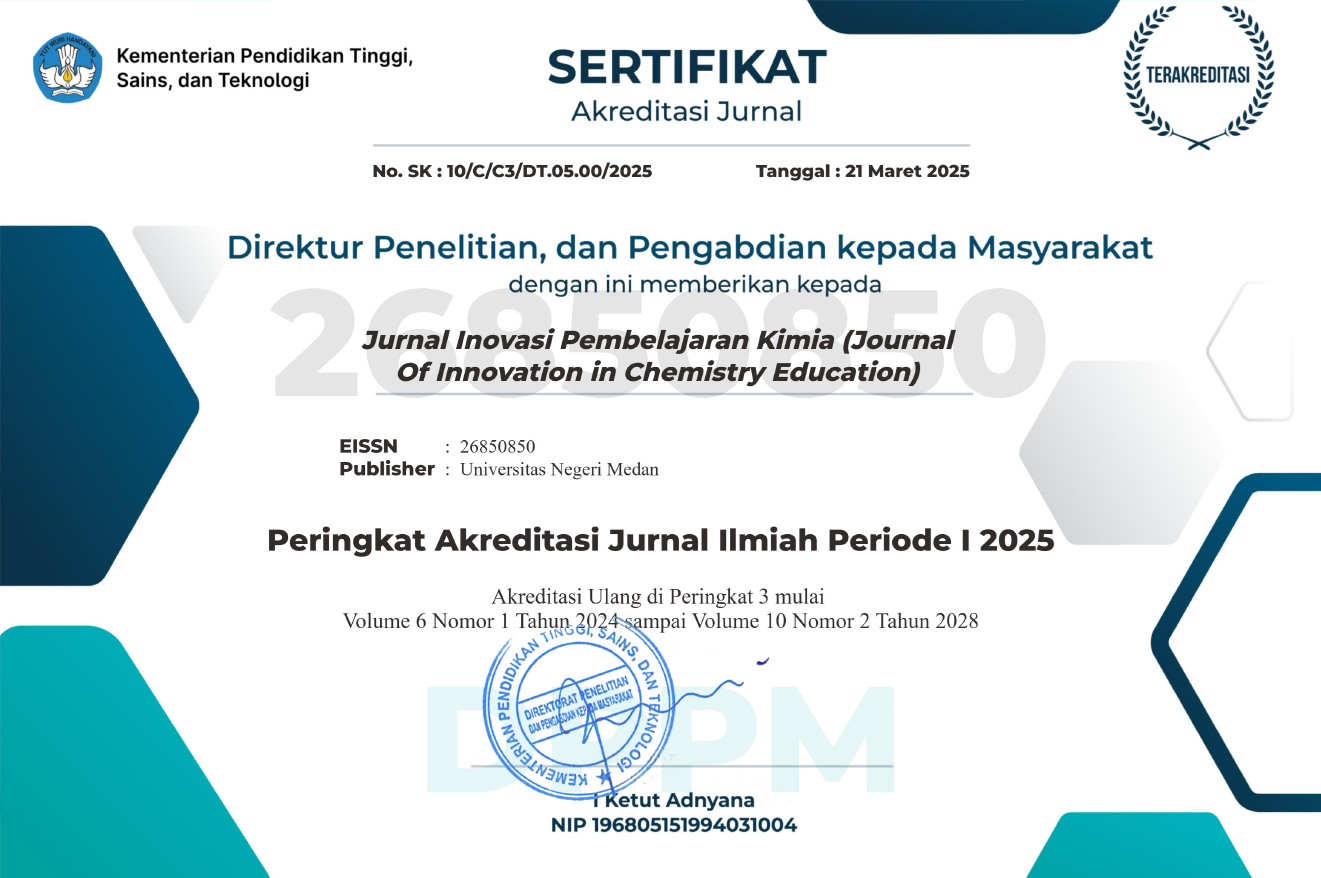Pengaruh Penerapan Model Inkuiri Terbimbing Terhadap Keterampilan Proses Sains dan Hasil Belajar Siswa
DOI:
https://doi.org/10.24114/jipk.v1i1.12534Keywords:
Guided Inquiry, Science Process Skill, Salt hydrolysis, Solubility and Solubility ProductAbstract
This study aims to find out: 1) whether the increase in student learning outcomes taught by the Guided Inquiry model is higher than the increase in student learning outcomes taught by Conventional models; 2) whether the increase in the Science Process Skill (SPS) of students who are taught with the Guided Inquiry model is higher than the increase in the student's SPS that is taught with Conventional models; 3) is there a significant correlation between learning outcomes and student SPS through the application of Guided Inquiry model. The population of this study is all students of class XI MIA 1 Binjai Public High School and Binjai 5 Public High School year 2017/1018. Samples were taken using purposive sampling technique as many as two classes. The test instrument used is 40 multiple choice questions (cognitive), 10 essay questions (SPS). The non-test instruments used were observation sheets (affective, psychomotor) and questionnaire sheets. Based on the results of the study it can be concluded that there is an increase in learning outcomes, science process skills and there is a significant correlation in students who are taught by using the Guided Inquiry model higher than the increase in student learning outcomes using Conventional models.References
Almuntasheri, S., Gillies, R.M., & Wright, T. (2016). The Effectiveness of a Guided Inquiry-based, Teachers™ Professional Development Programme on Saudi Students™ Undertstanding of Density, J of SciEduIntern, 4 (1), pp 16-39.
Arifin, U.F., Hadisaputo, S., & Susilaningsih, E. (2015). Pengembangan Lembar Kerja Praktikum Siswa Terintegrasi Guided Inquiry untuk Keterampilan Proses Sains, JInovPend Kim, 4 (1): 1-7.
Assriyanto, K.E., Sukardjo, J. S., & Saputro, S. (2014). Pengaruh Model Pembelajaran Berbasis Masalah Melalui Metode Eksperimen dan Inkuiri Terbimbing Ditinjau dari Kreativitas Siswa pada Materi Larutan Penyangga di SMAN 2 Sukoharjo Tahun Ajaran 2013/2014, J Pend Kim, 3 (3): 90.
Fajariyah, N. (2016). Penerapan Model Pembelajaran Inkuiri Terbimbing Untuk Meningkatkan Kemampuan Berpikir Kritis dan Prestasi Belajar Pada Materi Kelarutan dan Hasil Kali Kelarutan Siswa Kelas XI SMA Al Islam 1 Surakarta Tahun Ajaran 2014/2015, J Pend Kim(JPK), 5 (2): 92
Juniar, A., Manalu, L., & Debby, M. (2017). Development of Guided Inquiy-Based Module on The Topic of Solubility and Solubility Product (Ksp) in Senior High School. Advances in Social Science, Education and Humanities Research, 104, 70-73.
Koksal, E., & Barberoglu, G. (2014). The Effect of Guided-Inquiry Instruction on 6th Grade Turkish Students™ Achievement, Science Process Skills, and Attitudes Toward Science, Intern Jof Sci Edu, 36 (1), pp. 66-78.
Neil, F., & Luisa, L. (2015). Using Presentation Software To Flip an Undergraduate Analytical Chemistry Course. Journal of Chemical Education, 92, 1559 - 1563.
Pedaste, M.. (2015). Phases of inquiry based learning: Definitions and The Inquiry Cycle, J of Edu Research Rev, p. 47.
Semiawan, C. (1992), Pendekatan Keterampilan Proses,PT. Gramedia, Jakarta.
Setiowati, H., Nugroo, A., & Agustina, W. (2015). Penerapan Model Pembelajaran Inkuiri Terbimbing (GuidedInquiry) Dilengkapi Lks Untuk Meningkatkan Aktivitas Dan Prestasi Belajar Siswa Pada Materi Pokok Kelarutan dan Hasil Kali Kelarutan Kelas XI MIA SMA Negeri 1 Banyudono Tahun Pelajaran 2014/2015, J Pend Kim (JPK), 4 (4): 56.
Wardani., Widodo, A.T., & Priyani, N. E. (2009). Peningkatan Hasil Belajar Siswa Melalui Pendekatan Keterampilan Proses Sains Berorientasi Problem-Based Instruction, J InovPendKim, 3 (1) : 391-399.
Wulanningsih, S., Prayitno, B., & Probosar, R. (2012). Pengaruh Model Pebelajaran Inkuiri Terbimbing Terhadap Keterampilan Proses Sains Ditinjau dari Kemampuan Akademik Siswa SMA Negeri 5 Surakarta, JPendBio, 4 (2): 33-43.
Yager, R. E., & Akcay, H. (2010). The Advantages Of An Inquiry Approach For Science Instruction In Middle Grades, J of Scieand Math, 110 (1), pp 5-12.













